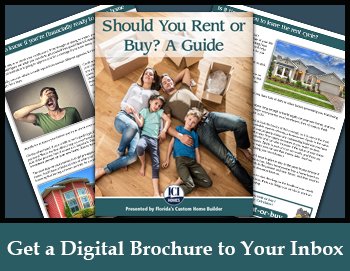
Buying a home is a serious adult activity. None of it is one-size-fits-all. We’re as individual as our DNA and life situations, and it’s silly for us — or anyone — to dictate decisions to you. Our goal in Buying Versus Renting is drilling down to basics, using practical realities and our experience from more than three decades as Florida’s Custom Home Builder.
Once you’re ready to buy a new home, view your situation through the lens of our suggestions, just as you’d apply a magnifying glass to the fine print of an advertisement.
Clarity is what we want for all potential new-home buyers. Walking you through the process helps defeat some of its confusion. What you decide is up to you.
However, we’ll leave you with some final, practical advice.
Don’t be house-rich and cash-poor
We can’t over-state this: it does no good to buy a new home, then struggle to meet your financial obligations each month. Renting will feel preferable at that point — because you probably didn’t do enough homework.
You may have to wait longer than you’d like to buy a home because your financial health needs bolstering. That’s okay. Take the time. It’s always — always — smarter to know you can buy a home than assume you can and attempt to anyway.
Don’t stall out over complicated math, taxes and legalese
There’s a reason we’ve avoided using all except broad-stroke numbers in Buying Versus Renting. Most of us aren’t financial experts. You do need to understand how all those numbers come together during the home-buying process, but most calculations — monthly income and monthly expenses, mortgage payments, buyer’s fees, etc., — can be summed up in simple math.
This is why you do homework before you embark on the home-buying process, then distill what you’ve learned down to language and math you can understand. Who cares if it’s super-simplistic?
A helpful method is listing everything, whether online, on paper or in a spreadsheet: “here’s what my probable mortgage payment looks like and how it breaks down each month— where each portion of it goes.”
Or, “here’s how much extra income I’ll/we’ll need to add a mortgage payment to monthly expenses.”
Or, “here’s how buying a new home will affect me/us tax-wise next year — and afterward.”
And, “here’s all the legal documents I’ll have to sign at closing and what they mean.”
Pull all of it together, then sit down with your accountant or financial adviser (if you don’t have one or the other, it’s time), and GO OVER EVERYTHING. Vetting numbers with a professional spotlights your situation. It also helps you catch mistakes and discover pleasant surprises such as, “I really can afford to buy a home.”
If you know you’ll struggle matching up your personal financial information with all the expenses associated with buying a home, take your raw material (bank statements, pay stubs, so on) and home-buying research to someone you trust who’s financially savvy, and ask them to help you sort it all out.
This may be your accountant or financial adviser. If not, and you don’t know anyone with those skills, seek local nonprofits or community organizations that offer such help, or can recommend someone.
There’s always a way!
If you landed here first, catch up with Parts 1, 2, 3, and 4 of our Buying Versus Renting series. If you’re ready to buy a home, ICI Homes is ready too. Start the conversation.
you landed here first, catch up with Parts 1, 2, 3, and 4 of our Buying Versus Renting series. If you’re ready to buy a home, ICI Homes is ready too. Start the conversation.







